About
The Collaboratory
Funded by the Andrew W. Mellon Just Futures initiative, the Black Studies Collaboratory aims to bring together artists, activists and scholars to amplify the interdisciplinary, political and world-building work of Black Studies. The task of building life-affirming institutions is more urgent than ever. We take this moment as an invitation to reimagine African American Studies’ relationship to the university and in turn reimagine the institution’s relationship to its surrounding black communities. We ask, how might the insights and practices of the Black Radical, Black Intellectual and Black Feminist traditions–which value methodological experimentation, epistemological breadth, and multipositional participation–be used to produce new modes of knowledge production, scholarly engagement and community practice? Organized around the themes of archives, activism and arts, the Black Studies Collaboratory consists of The Abolition Democracy Fellows Program, the Global Black Feminisms Summer Lab, the Black Studies Collaboratory Open University course, and a Black Futures Retreat that will be the culmination of the initiative.
The BSC is built around five key goals:
- Nurture, support, generate and amplify innovative work centered in Black humanity
- Create shared space for experimentation and collaboration by bringing activists, artists and academics at various stages in their careers into critical engagement and collaborative imagining
- Provide robust programming and generative tools for campus and Bay Area communities
- Develop and practice a new model of public-facing Black Studies
- Create opportunities for joyful and generative engagement among Black faculty, students, and staff, the surrounding community and around the country
About Our Logo
We borrow our logo design from a button made for The Rainbow Sign, a Black cultural arts center in Berkeley where Ntozake Shange, Maya Angelou, Richard Pryor and Nina Simone were frequent performers. The Rainbow Sign was active 1971 to 1977 and was a place where folks could break bread, discuss ideas, share new work, listen to music, dance and be in community. All were welcome. Our logo is an effort to channel the history and spirit of The Rainbow Sign.
About Our Cover Art
Our homepage image is courtesy of Yashua Klos, titled, Diagram of How She Hold it All Together, 53”x 52,” paper construction of woodblock prints and graphite on archival Japanese rice paper, 2021.
People
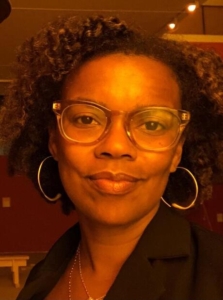
Leigh Raiford
Co-PI and Inaugural Director is Associate Professor of African American Studies at the University of California at Berkeley
Leigh Raiford (she/they), Co-PI and Inaugural Director is Professor of African American Studies at the University of California at Berkeley, where she teaches, researches, curates and writes about race, gender, justice and visuality. She is the recipient of fellowships and awards from the American Council of Learned Societies, the Ford Foundation, Volkswagen Foundation (Germany), the Mellon Foundation, the Woodrow Wilson foundation, and the Hellman Family Foundation and has also been a Fulbright Senior Specialist.
Raiford is the author of Imprisoned in a Luminous Glare: Photography and the African American Freedom Struggle (University of North Carolina Press, 2011), which was a finalist for the Berkshire Conference of Women Historians Best Book Prize. She is co-editor with Heike Raphael-Hernandez of Migrating the Black Body: Visual Culture and the African Diaspora (University of Washington Press, 2017) and with Renee Romano of The Civil Rights Movement in American Memory (University of Georgia Press, 2006). Her work has appeared in numerous academic journals, including Art Journal, American Quarterly, Small Axe, Qui Parle, History and Theory, English Language Notes and NKA: Journal of Contemporary African Art; as well as popular venues including Artforum, Aperture, Ms. Magazine, Atlantic.com and Al- Jazeera.com. Raiford’s essays have also been included in the collections Remaking Reality: U.S. Documentary Culture After 1945, edited by Sara Blair, Joseph Entin and Franny Nudelman; Only Skin Deep: Changing Visions of the American Self, (Harry N. Abrams Press, 2003), a history of race and photography in the United States edited by Coco Fusco and Brian Wallis; and Pictures and Progress: Early Photography and the Making of African American Identity, (Duke, 2012), edited by Maurice O. Wallace and Shawn Michelle Smith.
Raiford has written essays about the work of a number of contemporary Black artists, including LaToya Ruby Frazier, Lava Thomas, Mildred Howard, Toyin Ojih Odutola and Dawoud Bey. In 2019, she co-curated the group shows Plumb Line: Charles White and the Contemporary at the California African American Museum, Los Angeles (with Essence Harden) and About Things Loved: Blackness and Belonging at the Berkeley Art Museum/Pacific Film Archive
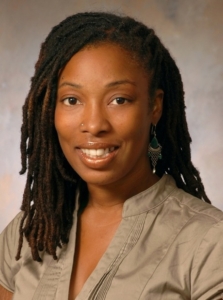

Tianna Paschel
Co-PI is an associate professor in the Department of African American Studies and Sociology at the University of California – Berkeley
Tianna Paschel, Co-PI is an associate professor in the Department of African American Studies and Sociology at the University of California – Berkeley. She is interested in the intersection of racial ideology, politics, and globalization in Latin America. Her work can be found in the American Journal of Sociology, the Du Bois Review, SOULS: A Critical Journal of Black Politics, Culture and Society, and Ethnic and Racial Studies and various edited volumes. She is also the author of Becoming Black Political Subjects, which draws on ethnographic and archival methods to explore the shift in the 1990s from ideas of unmarked universal citizenship to multicultural citizenship regimes and the recognition of specific rights for black populations by Latin American states. It is the winner of numerous awards including the Herbert Jacob Book Award of the Law and Society Association and the Barrington Moore Book Award of the American Sociological Association (ASA). Professor Paschel is also the co-editor – along with Petra Rivera-Rideau and Jennifer Jones – of Afro-Latin@s in Movement, an interdisciplinary volume that explores transnationalism and blackness in the Americas.
Professor Paschel is a Ford Fellow, member of the American Political Science Association Task Force on Race and Class Inequality, the Council of the Law Section of ASA, and the Steering Committee of the Network of Anti-Racist Action and Research (RAIAR).
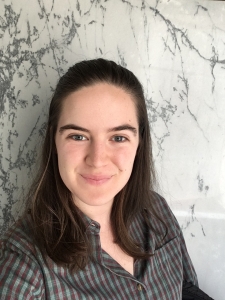

Barbara Montano
Project manager of the Black Studies Collaboratory in the Department of African American Studies at the University of California, Berkeley.
Barbara Montano (she/her) is project manager of the Black Studies Collaboratory in the Department of African American Studies at the University of California, Berkeley. In 2018, Barbara received a B.A. from UC Berkeley in English and Legal Studies. She formerly worked as a development associate with Grantmakers Concerned with Immigrants and Refugees (GCIR) and as an executive assistant and financial analyst at UC Agriculture and Natural Resources (UC ANR). She is passionate about facilitating transformative systems change, abolition, and healthy communities, oriented in relationship, joy, and the politics and work of Black Studies. Barbara is also an organizer, dancer, writer, and book lover.
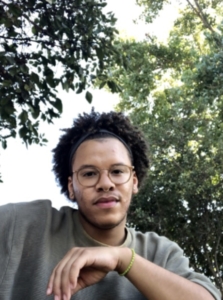

Gilberto Rosa-Duran
Doctoral student in the Department of African American studies at the University of California, Berkeley
Gilberto Rosa-Duran is a doctoral student in the Department of African Diaspora Studies at UC Berkeley where they think and write about sexual legacies of racial and colonial violence in the Caribbean and its diasporas. Gilberto holds a Bachelor’s degree from Brandeis University in Black Studies and Women’s Studies. They are also a dancer, photographer and astrology student from New York City.


Rachel Anspach
Doctoral student in Berkeley’s African American Studies Department
Rachel Anspach is a doctoral student in Berkeley’s African American Studies Department who studies philanthropy, education policy and identity construction. She is also an independent journalist whose work on the intersections of race, gender and sexuality in American politics has been published in outlets such as Teen Vogue, Slate, Jezebel and Rewire. Rachel previously served as Senior Editor & Writer for the African American Policy Forum, an intersectional feminist think tank, where she co-authored Say Her Name: Resisting Police Brutality Against Black Women. In addition to writing and research, Rachel is also passionate about nature, makeup, food and cats.
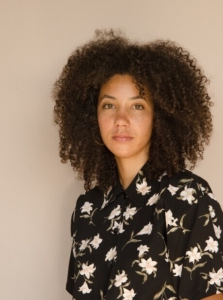

Delphine Sims
Doctoral candidate in the History of Art Department at the University of California, Berkeley
Delphine Sims is a doctoral candidate in the History of Art Department at the University of California, Berkeley. She studies the history of photography in the Americas. Her research focuses on the ways in which race, gender, geography, and urbanity inform landscape photography. She previously worked at the Santa Barbara Museum of Art as the Curatorial Assistant in the Department of Photography and she also interned at the Berkeley Art Museum and Pacific Film Archive and San Francisco Museum of Modern Art. Delphine is art obsessive, but perhaps equally so, she loves television and long walks in the Southern California desert landscape where she grew up.
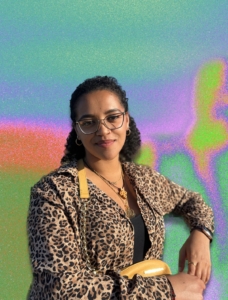

Alexandra Gessesse
Doctoral student in the Department of African American & African Diaspora Studies at the University of California, Berkeley
Alexandra Gessesse is a doctoral student in the Department of African American & African Diaspora Studies at UC Berkeley, where she thinks and writes about Black social movements, diasporic identity construction, community and neighborhood organizations, and transnationalism. Alexandra previously served as a Research Policy Analyst for the Congressional Black Caucus Foundation, whose publications on housing policy, social justice, and tech policy led to a term she coined, “Digital Redlining,” which examines the effects of race, gender, and stereotypes on online algorithms and accessible internet data. She holds a Bachelor’s degree from UC Santa Barbara in Black Studies, focusing in Social Policy. Alexandra is a painter, dancer, lover of sidewalks, and a Black Twitter enthusiast.


franchesca araújo
Doctoral student in the Department of African American & African Diaspora Studies at the University of California, Berkeley
franchesca is a 3rd year PhD student in Black Studies. She’s grounded in Caribbean studies and theory and is interested in Black geographies and Black cultural productions of the Spanish speaking Caribbean. Right now, she’s working on Dominican and Haitian relations and continuities of anti-colonial insurgency, and is grounded in the possibilities of an antillenité method and contesting the violences of latinidad. She is in conversation with Black and Indigenous anti-colonial feminism from the Caribbean and Latin america. Franchesca is also a dancer and aspiring DJ.
Advisory Board
In addition to Dr. Tianna Paschel and Dr. Leigh Raiford, the Black Studies Collaboratory Advisory Board includes Dr. Nadia Ellis, Associate Professor in the English Department; Dr. Nikki Jones, Professor & H. Michael and Jeanne Williams Department Chair in the African American Studies Department; Dr. Dareick B. Scott, Associate Professor in the African American Studies Department; Dr. Brandi T. Summers, Assistant Professor of Geography and Global Metropolitan Studies; and Dr. Ula Y. Taylor, Professor in the African American Studies Department.
